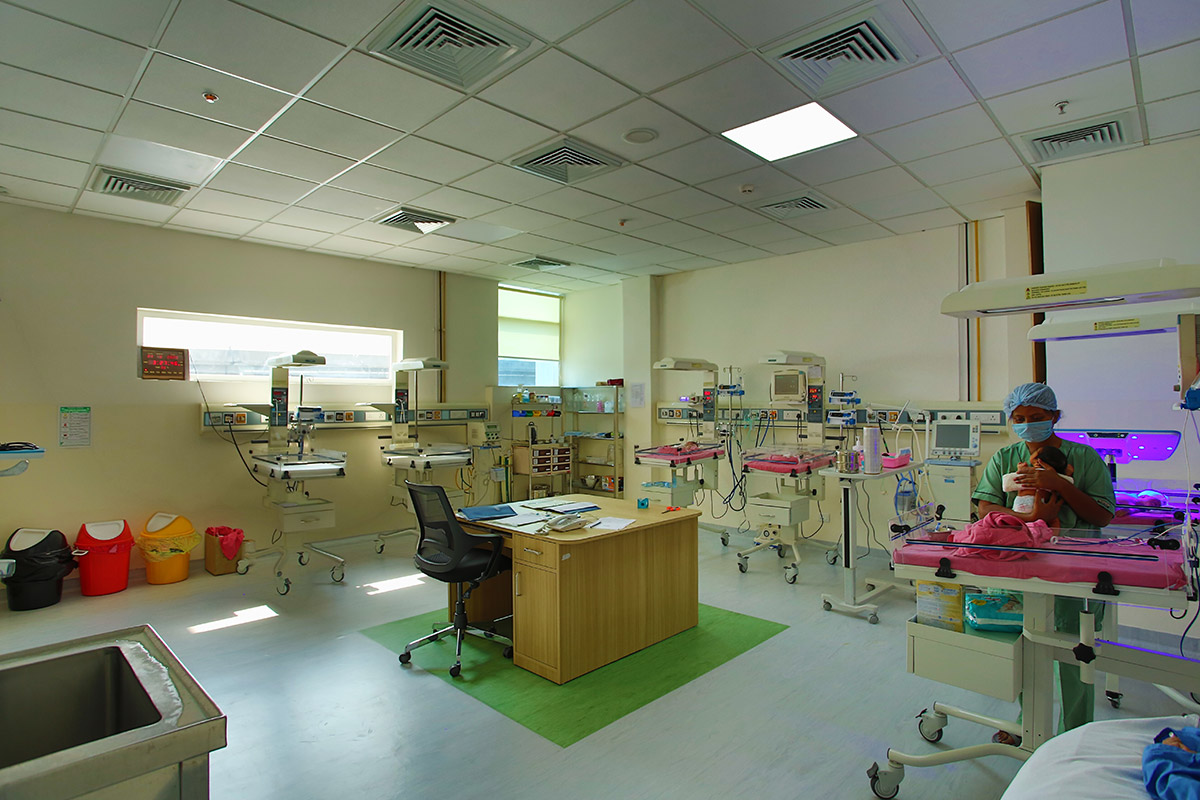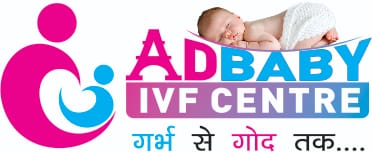Fertility Services
Infertility is a condition when a couple fails to conceive after one year of regular sexual intercourse if a woman is less than 35 years of age or 6 months if a woman is above than 35 yeras of age. The reason of infertility can be a problem in Male partner/ Female partner or both.

Infertility In Women
Conditions affecting a woman’s fertility can include:
- Damage to the fallopian tubes
- Ovulatory problems
- Endometriosis
- Conditions affecting the uterus
- A combination of factors
- No identifiable reason or unexplained infertility.
- Age – female fertility declines sharply after the age of 35
- Polycystic Ovary Syndrome (PCOS)
- Gynaecological problems such as previous ectopic pregnancy or having had more than one miscarriage
- Medical conditions such as diabetes, epilepsy, and thyroid and bowel diseases
- Lifestyle factors such as stress, being overweight or underweight, and smoking.
Infertility In Men
Conditions that may result in infertility include:
- Low sperm count or quality
- Problems with the tubes carrying sperm
- Problems getting an erection
- Problems ejaculating.
- Having had inflamed testes (orchitis)
- A past bacterial infection that caused scarring and blocked tubes within the epididymis as it joins the vas
- Having received medical treatment such as drug treatment, radiotherapy or surgery – for example to correct a hernia, undescended testes or twisted testicles
- Genetic problems
- Diabetes
- Lifestyle factors such as being overweight or having a job that involves contact with chemicals or radiation.
- Male fertility is also thought to decline with age, although to what extent is unclear.

Overview
The initial workup for an infertile couple is done to select the right kind of fertility treatment for such couples based on the reports. The infertile couples must undergo a set of advance tests before the commencement of any treatment. These tests are comprehensive & detailed and are essential to determine the causes of infertility, whether the couples are diagnosed with any other ailment and which technique would be most suitable for a couple.
Female partner must undergo trans-vaginal ultrasound to evaluate ovarian reserve & uterus condition, blood tests and laparoscopy or hysteroscopy in cases where there is indication of such operative requirement after the initial workup. Male partners need to undergo a semen analysis to determine the quality, quantity, mobility and motility of the sperm along with few blood tests.

Treatments
In this procedure, husband’s semen/donor semen is washed to remove the debris, pus cells & bacteria & is placed inside the uterine cavity by a special catheter (Insemination cannula). The process is painless, easy & an OPD procedure. It requires no sedation or anaesthesia. It increases the chances of pregnancy as the semen quality is improved by washing, the quality of egg is improved by medicine & the timing of insemination is set with the ovulation.
The ovaries are gently stimulated with clomiphene citrate tablets either alone or with low dose hormone injections followed by ultrasound monitoring until the follicles are mature when HCG trigger is given. The aim is to stimulate the release of one or two eggs only. Once day of ovulation can be predicted, insemination will be timed to within 24 hrs.
The success rate with this procedure is in the range of 10 – 15 % and 3 – 6 cycles are generally advocated before proceeding to higher ART forms.
IVF literally means ‘fertilization in glass,’ more simply explained as ‘test tube baby’. In the IVF process, eggs are removed from the ovaries of the female and at the same time sperms are collected from the male partner. The eggs and sperms are made to fertilize in the laboratory and the fertilized egg (embryo) is then implanted in the woman’s womb to make her conceive.
- Women with bilateral tubal block- an absolute indication for IVF
- Women with one fallopian tube blocked and one open but still not able to conceive with IUI.
- Infertility of more than 5 years due to any cause.
- Infertility of more than 2years with no identifiable cause.
- Women with endometriosis (chocolate cysts)
- Previous ectopic pregnancies.
- More than 6 cycles of unsuccessful IUI (Intra uterine insemination)
- Women with problem in follicular rupture (LUF).
- Prolonged unexplained infertility.
- Decreased sperm counts than normal but >5million/ml
- Women with pelvic TB.
- Failed tuboplasty.
- No pregnancy even after repeated cycles of ovulation induction injections despite ovulation.
Intracytoplasmic Sperm Injection means fertilization of an egg in the laboratory by injecting a single sperm inside it with the help of a sophisticated machine called micromanipulator. Embryos (babies) are transferred after 48 to 72 hours.
- When husband’s sperm count is <5million or even an occasional sperm seen in the semen.
- Presence of anti-sperm antibodies.
- Presence of sperms inside the testes when tubes are blocked.
- Early cases of testicular atrophy.
- After sterilization operation.
- Extremely low motility of sperms.
- After spinal injury and other sexual dysfunctions.
For azoospermia men with an obstructive pathology (e.g. Congenital absence of vas deferens) sperm can be aspirated directly from the epididymis (PESA) and used for ICSI. In addition, for azoospermia men with a non-obstructive pathology, sperm can be retrieved directly from the testis (TESA) and used for ICSI.
This is a technique in which sperms, eggs and embryos are frozen at a sub-zero temperature to preserve them for future when the need arises. There are 3 types of Cryopreservation in IVF spectrum:
- Semen Cryopreservation
- Eggs Cryopreservation
- Embryos Cryopreservation
Semen Cryopreservation: Semen are frozen to preserve because of the following reasons: a) To develop sperm bank b) To donate stored semen c) In cases where husband is in air force, army or any other or unavailable for intercourse at the time of ovulation, preserve semen can be inserted Intravaginally/ Intrauterine through procedure called as IVI or IUI. d) To use it during the treatment if the male partner is unable to ejaculate on the stipulated day e) Before undergoing vasectomy f) Prior to cancer treatment which might adversely affect fertility g) Retrieved semen from epididymis (PESA) or testes (TESA).
Egg (Oocyte) Cryopreservation: This is for women who are about to undergo medical treatment for ailments such as cancer which may affect her ability to produce eggs in the future. This technique is also useful for women who are career-oriented and do not want early motherhood. Eggs are frozen within few hours of collection through the standard freezing process. Later, when women are ready to be pregnant, the frozen eggs are thawed, fertilized with the husband’s sperms and resultant embryo is implanted in the uterus.
Embryos Cryopreservation: During treatments like IVF, ICSI the best embryos are selected and transferred during the first cycle.If any good quality embryos are left, they are frozen for future use.
When the wife has lost the capacity to produce her own eggs, the eggs then have to be borrowed from another healthy young woman. The eggs are fertilized and implanted in the womb of the female partner.
- When a woman is born with absent ovaries, but the uterus is present.
- When woman’s age is more than 40years.
- Removal of ovaries for some disease.
- Destruction of ovaries by endometriosis or some other disease.
- Depletion of eggs from ovaries i.e. premature menopause.
The ICMR guidelines for IVF clinics in India permit egg donation and the use of egg donors for this purpose. Our clinic maintains the highest standards for selection of egg donors, screening for disease, repeat checks for sexually transmitted diseases such as HIV, Hepatitis B, C and syphilis and other checks as requested by couples
Embryo Donation: When both the male partner and the female partners are infertile, they opt for embryo donation. In this, the embryo is developed by fusing the sperm and eggs of donors and the embryo is implanted in the uterus of female partner. The couple who are donating the sperm and the eggs undergo a series of tests to rule out any medical ailment and ensure good quality of sperm & eggs.
- Badly damaged or absent uterus due to operations, tumors or TB.
- Severe medical diseases.
- A surrogate mother can be a suitable alternative.
So, gone are those days when age was a constraint to experience motherhood and attaining menopause came along with sorrow of inability to reproduce. IVF (In Vitro Fertilization) has proved to be a boon to all those couples who’ve only dreamt of becoming parents but could never see their dream coming true due to insurmountable reasons.
Investigation and management of infertile couples, forms a major portion of our general gynaecology practice. We offer full time access topelvic ultrasound scanning and support the management of fertility and early pregnancy related issues.
We offer an initial consultation, and diagnostic test in one visit. We are equipped to perform all tests and scans simultaneously, and to draw up and execute a treatment plan immediately. Making our clinic a one-stop solution for conditions such as abnormal bleeding, in which a scan, consultation and the surgical procedures (endometrial biopsy, levonorgestrel IUCD insertion) can take place in a single visit under local anaesthesia.

